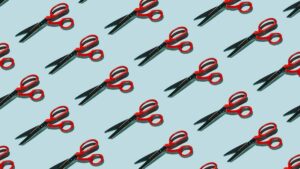Citadel legend Ken Griffin shares his two cents on bank bailouts: Capitalism ‘breaking down before our eyes’

OMG! US Capitalism look out behind you! Via Getty
Ken Griffin, the legendary founder of legendary hedge fund Citadel, reckons the US didn’t just muck up by bailing out Silicon Valley Bank (SVB) this week, but thinks the rescue package and subsequent emergency surgery performed by US regulators shows just how sick the US financial system really is.
American capitalism is “breaking down before our eyes”, Griffin said in an interview with FT on Monday
The US government shouldn’t have got out of bed to protect all the SVB depositors following the collapse of the Santa Clara-based bank on Friday, Griffin says.
“The US is supposed to be a capitalist economy, and that’s breaking down before our eyes,” he said a day after US regulators pledged to protect all depositors in SVB — even those with balances above the $250,000 federal insurance limit.
He’s not the only US billionaire with two cents to shake at the entire mess. It turns out lots of these people just don’t like the rescue plan.
All deposits guaranteed? Big mistake. Fed and Treasury policy moving to backstop risk.
— Bill Gross (@real_bill_gross) March 13, 2023
“All deposits guaranteed? Big mistake. Fed and Treasury policy moving to backstop risk,” billionaire Bill Gross wrote on Twitter.
Cathie Wood, the CEO of high-profile Ark Investment Management, also suggested that regulators shut the gate once the horse had bolted – saying banks like SVB were facing collapse because they were too preoccupied with creating rules for her more reliable and well-behaved crypto companies.
Looking to get the attention of Elon Musk, she tweeted that the banking crisis was “looming in plain sight”.
The echo is more like the early 1920s, after a pandemic and a war – the Spanish Flu and WWI – as three major innovation platforms were evolving into mass market opportunities – electricity, telephony, and the automobile, contributing to the breathtaking “Roaring Twenties” https://t.co/EIcAeEcJmF
— Cathie Wood (@CathieDWood) March 15, 2023
Worth circa US$32 billion, according to Forbes, Griffin’s firm Citadel has some US$57 billion in assets under management.
“There’s been a loss of financial discipline with the government bailing out depositors in full,” Griffin added. SVB was shut down by US regulators after customers raced to withdraw US$42bn — a quarter of its total deposits — in one day and a failed effort to raise new capital called into question the future of the tech-focused lender.
It’s been one week since US regulators shut down SVB after customers withdrew their deposits en masse. Later, the Federal Deposit Insurance Corporation (FDIC) transferred all deposits of Silicon Valley Bank to a newly created entity and ensured that all depositors had access to their funds starting Monday.
Because of the relative strength of the US economy, Griffin argues the federal government didn’t need to intervene, damning regulators for moves reserved for halting any broader contagion into the US banking sector.
“It would have been a great lesson in moral hazard,” he said. “Losses to depositors would have been immaterial, and it would have driven home the point that risk management is essential.
“We’re at full employment, credit losses have been minimal, and bank balance sheets are at their strongest ever. We can address the issue of moral hazard from a position of strength.”
The US Treasury, the FDIC, and The Fed all took action last weekend to guarantee depositors of SVB and Signature Bank of New York would get their money.
That includes amounts above the FDIC limit of US$250,000.
Despite those measures, there’s still a bunch of regional bank stocks which have crashed during the week and a bunch of Americans freaking out about their savings.
As of Friday New York time, March 16, the Dow Jones had shed another 380 points.
Treasury Secretary Janet Yellen told lawmakers that the American banking system “remains sound” and that savings “remain safe.”
“I can assure the members of this Committee that our banking system remains sound and that Americans can feel confident that their deposits will be there when they need them.”
The billionaire founder of Pershing Square Capital Management, Bill Ackman, originally wanted the FDIC and federal government to move quickly to prevent contagion from SVB from spreading to other banks.
But now the big lenders are getting into push he reckons Janet Yellen et al are effectively infecting everyone else with the same virus.
“The result is that FRB default risk is now being spread to our largest banks. Spreading the risk of financial contagion to achieve a false sense of confidence in FRB is bad policy. The SIBs would never have made this low return investment in deposits unless they were pressured to do so and without assurances that FRB deposits would be backstopped if it failed.”
Ackman warned that “the destruction of these important institutions” will start once depositors withdraw their money from community and regional banks.
.@SecYellen has apparently pushed the SIBs to recycle some of the deposits they received from @firstrepublic back into FRB for 120 days. The result is that FRB default risk is now being spread to our largest banks.
Spreading the risk of financial contagion to achieve a false… https://t.co/rDwQophwly
— Bill Ackman (@BillAckman) March 17, 2023
Then of course, there’s Ray Dalio. Who’s not only calm, concise and measured…
He also knows how to present his ideas.
I’ve been doing an AMA on social media and getting a lot of great questions. Here are some thoughts I had in response to a question about Silicon Valley Bank: https://t.co/YRpIYpWtEC
— Ray Dalio (@RayDalio) March 14, 2023
Related Topics
UNLOCK INSIGHTS
Discover the untold stories of emerging ASX stocks.
Daily news and expert analysis, it's free to subscribe.
By proceeding, you confirm you understand that we handle personal information in accordance with our Privacy Policy.








